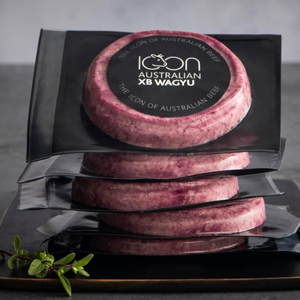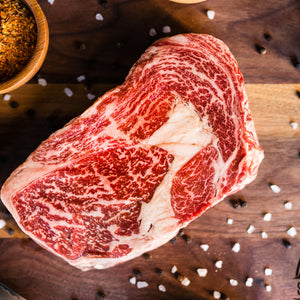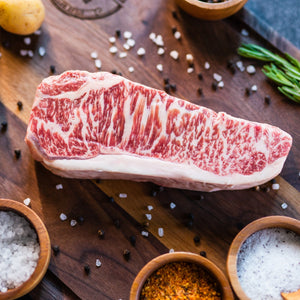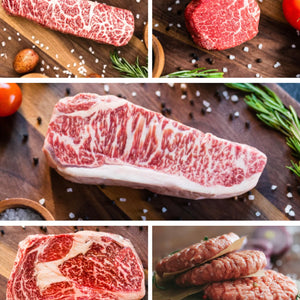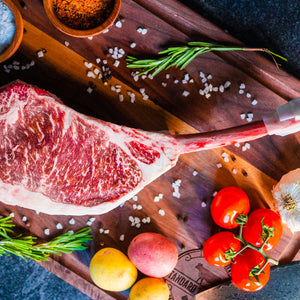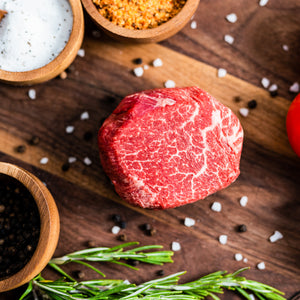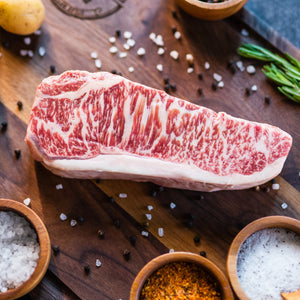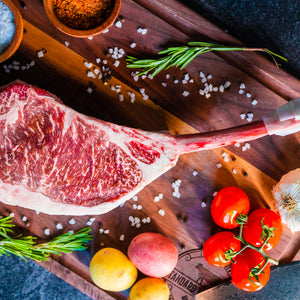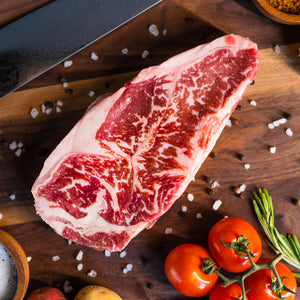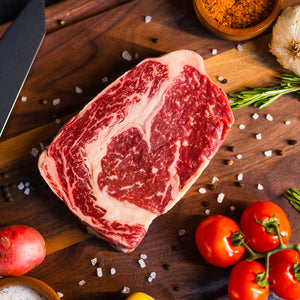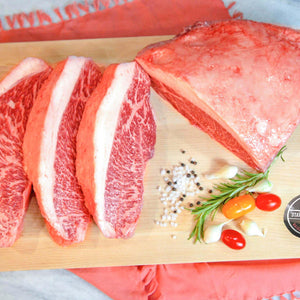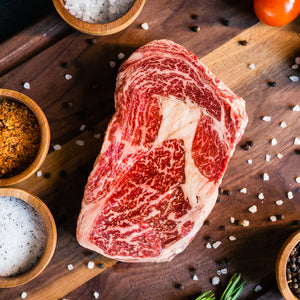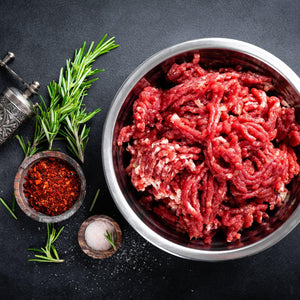Health Benefits of Wagyu Beef: Why This Luxurious Steak Is Surprisingly Good for You
Sep 22, 2025
Health Benefits of Wagyu Beef: Why This Luxurious Steak Is Surprisingly Good for You
Meta Description (SEO):
Wagyu beef isn’t just delicious—it’s also rich in heart-healthy fats, omega fatty acids, and nutrients. Discover the full health benefits of Wagyu, plus cooking and buying tips.
Introduction: The Surprising Side of Wagyu Beef
When most people think of Wagyu beef, they imagine indulgence—melt-in-your-mouth marbling, sky-high prices, and fine dining luxury. But here’s what often gets overlooked: Wagyu isn’t just about taste. Its unique fat composition and nutrient profile mean it may actually be healthier than many conventional beef options.
So, can Wagyu beef really be good for you? The answer is yes—when eaten in moderation. In this article, we’ll dive deep into the nutritional science behind Wagyu, highlight its health benefits, and share practical tips for enjoying this world-class beef in a balanced diet.
The Unique Fat Profile of Wagyu Beef
The hallmark of Wagyu is its intense marbling—intramuscular fat distributed evenly throughout the meat. Unlike many cuts of beef, Wagyu’s fat has a lower melting point and a composition closer to olive oil than butter.
Monounsaturated vs. Saturated Fats
-
Wagyu contains up to 60% monounsaturated fat (MUFA), compared to 40–50% in conventional beef.
-
MUFAs are linked to improved cholesterol balance and reduced heart disease risk.
-
The saturated fat in Wagyu has a higher proportion of stearic acid, which has a neutral effect on cholesterol compared to palmitic acid (common in grain-fed beef).
👉 Takeaway: Wagyu fat is softer, healthier, and metabolizes differently than the fat found in standard beef.
Wagyu Beef and Heart Health
One of the most compelling benefits of Wagyu beef is its potential to support cardiovascular health.
Oleic Acid: The “Olive Oil” Connection
Wagyu beef is exceptionally high in oleic acid, the same monounsaturated fat that makes olive oil a cornerstone of the Mediterranean diet. Research suggests oleic acid can:
-
Lower LDL (“bad”) cholesterol.
-
Raise HDL (“good”) cholesterol.
-
Improve blood vessel function.
A study published in the Journal of Lipid Research found that diets rich in oleic acid contribute to lower blood pressure and improved heart health.
Omega-3 and Omega-6 Fatty Acids
Another standout feature of Wagyu is its ratio of omega-3 and omega-6 fatty acids. These essential fats are vital for brain function, inflammation control, and heart health.
-
Omega-3 (EPA & DHA): Supports brain health, reduces inflammation, and may lower risk of depression.
-
Omega-6 (Linoleic Acid): Supports energy, immunity, and cell growth.
Unlike typical beef, Wagyu provides a better balance of these fatty acids, making it a smarter choice for long-term wellness.
Wagyu Beef and Weight Management
At first glance, it might seem contradictory to link Wagyu beef with weight control. But the quality of its fat plays a role in satiety and metabolism.
-
Higher Satiety: The richness of Wagyu means smaller portions are satisfying, preventing overeating.
-
Thermogenic Effect: MUFAs are metabolized differently than saturated fats, sometimes leading to slightly higher calorie burn.
-
Balanced Diet Fit: Enjoyed in moderation (3–4 oz portions), Wagyu can be part of a balanced, protein-rich diet.
Nutritional Value Beyond Fat
Wagyu beef isn’t only about fat—it’s a powerhouse of essential nutrients:
-
High-Quality Protein: Supports muscle repair and immune function.
-
Iron (Heme Iron): Boosts energy and prevents anemia.
-
Zinc: Strengthens immunity and wound healing.
-
B Vitamins (B6, B12, Niacin): Support energy metabolism and brain health.
Comparison: Wagyu vs. Conventional Beef
| Nutrient | Wagyu Beef | Regular Grain-Fed Beef |
|---|---|---|
| MUFA | Higher (~60%) | Moderate (~40–50%) |
| Omega-3 | Higher | Lower |
| Oleic Acid | Very High | Moderate |
| Protein | Slightly Lower (due to fat) | Higher % per gram |
Mental Health and Cognitive Benefits
Emerging research suggests diets higher in omega-3 fatty acids may support brain health and reduce risks of cognitive decline. Wagyu, with its improved omega-3 profile compared to typical beef, may play a small but meaningful role in supporting mental clarity, memory, and mood regulation.
Imagine pairing a small slice of A5 Wagyu with brain-boosting foods like leafy greens and walnuts—you’d have a meal that satisfies both palate and mind.
Cooking Wagyu to Preserve Its Benefits
Cooking technique affects not only flavor but also nutrient retention.
Best Practices
-
Avoid Overcooking: High heat for too long breaks down delicate fats and reduces omega content.
-
Quick Sear: Pan-sear Wagyu for 1–2 minutes per side at high heat.
-
Minimal Additives: Use sea salt or light soy sauce instead of heavy sauces that overpower natural flavors.
Is Wagyu Healthier Than Other Beef?
In many ways, yes. Compared to grain-fed supermarket steaks, Wagyu’s fat profile is superior. However, compared to lean cuts like grass-fed sirloin, Wagyu is richer in calories.
Key Differences:
-
More Heart-Healthy Fats: Great for cholesterol balance.
-
Higher Calorie Density: Requires portion control.
-
Nutrient Dense: Richer in omega-3s and oleic acid.
Who Should Eat Wagyu Beef?
-
Fitness Enthusiasts: For protein and recovery.
-
People Focused on Heart Health: For MUFA and omega benefits.
-
Foodies Seeking Balance: For indulgence without guilt.
Caution: People with strict calorie restrictions or certain health conditions (like gallbladder disease) should consume Wagyu in smaller portions.
Pairing Wagyu With Healthy Sides
To maximize its nutritional potential:
-
Vegetables: Roasted asparagus, spinach, or broccoli for antioxidants.
-
Whole Grains: Brown rice or quinoa to balance richness.
-
Fermented Foods: Kimchi or miso soup to aid digestion.
👉 Actionable Tip: Create a “Japanese Wellness Plate” with Wagyu slices, miso soup, pickled vegetables, and steamed rice.
Addressing Common Myths About Wagyu Beef
“Wagyu is unhealthy because it’s fatty.”
❌ False. Its fat composition makes it healthier than conventional beef fat.
“Eating Wagyu will raise cholesterol.”
❌ Not entirely. The oleic acid may actually improve cholesterol profiles.
“Only lean beef is healthy.”
❌ Oversimplification. Wagyu’s unique fat and nutrient profile challenge that assumption.
Sustainability and Ethical Considerations
While health is one aspect, consumers are also concerned with how Wagyu is raised. Many Japanese farms practice small-scale, humane cattle raising with careful diets. Increasingly, carbon-neutral initiatives and U.S. Wagyu herds reduce environmental impact.
Final Thoughts: The Healthy Indulgence
Wagyu beef isn’t just about decadence—it’s a nutritional powerhouse when enjoyed mindfully. Its monounsaturated fats, omega fatty acids, and oleic acid make it a unique protein source that supports heart and brain health, while its richness encourages smaller, more satisfying portions.
Key Takeaways:
-
Wagyu’s fat is healthier than standard beef fat.
-
It’s rich in oleic acid, omega-3s, and essential nutrients.
-
Portion control is key—3–4 oz is enough for benefits without overload.
-
Cooking gently preserves health benefits.


